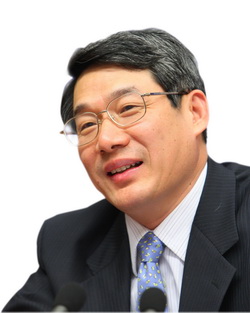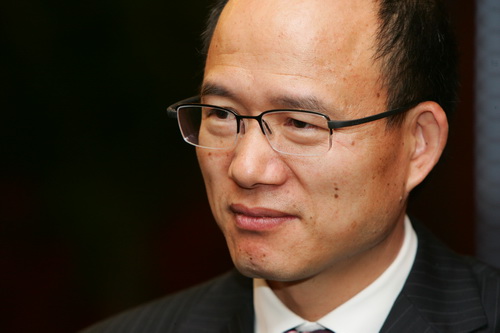Issue Wrap No. 503, Jan 17, 2010
Highlights from the EO print edition, Issue Wrap No. 503, Jan 17, 2010
The Land Troubles of Local Goverments
News, page 2
~ The Xi'an government was reprimanded by the Ministry of Land and Resources for several cases of illegal land use in November of last year. One of the plots of land in question was being developed by BYD Auto, a Shenzhen-based car manufacturer that is a subsidary of the Hong Kong-listed BYD Co Ltd, as a new manufacturing base for their vehicles, but construction on the site has now been halted.
~ The BYD project is not the only case of illegal land use in Xi'an.
~ As early as 2004, the Xi'an government had contracted all the land plots allotted for development between 1997 and 2010.
~ To promote the local economy, the government has resorted to illegal land deals with companies.
~ Xi'an is not the only city that has been disciplined by the Ministry of Land and Resources in this way.
~ The Shanghai government is having trouble providing compensation for farmland used for development in accordance with central government requirements.
Original article: [Chinese]
 Introducing the New Head of China's National Energy Administration
Introducing the New Head of China's National Energy Administration
News, page 3
~ Liu Tienan has taken the place of Zhang Guobao as the new head of the National Energy Administration (NEA), even though the Organization Department of the Central Committee of the CPC has not yet formally announced the news.
~ Liu Tienan's professional career includes leadership positions in various departments and agencies within the National Development and Reform Commission (NDRC), and he has already worked alongside Zhang Guobao for about a decade.
~ The NEA, which aside from the newly-formed National Energy Commission (NEC), is the highest government body charged with regulating China's energy sector and operates under the auspices of the NDRC, is currently facing a number of challenges, these include reforming energy prices, shifting the structure of China's energy production, dealing with the powerful monopolies which dominate the sector and how to encourage the development of the new energy sector.
~ One expert who was unwilling to be quoted by name told the EO that if Liu Tienan could be "promoted" during his term in office from being the head of the NEA, which is under the control of the NDRC, to becoming a minister of an independent Ministry of Energy, this would be a significant contribution both to the agency and China's energy sector in general.
Original article: [Chinese]
A New Road Map for 24 Trillion Yuan of Centrally-controlled State-owned Assets
News, page 7
~ Wang Yong, the new director of the State-owned Assets Supervision and Administration Commission (SASAC) - which operates under the authority of China's State Council - has outlined the direction he intends to take in relation to the management of state-owned assets over the coming five years.
~ Wang says that SASAC plans to strengthen management through the reform of centrally-controlled state-owned enterprises.
~ One of the major problems that state-owned enterprises have is a lack of ingenuity. So while large state-owned companies may continue to expand, they lack core competitiveness, which will soon became a serious obstacle to development.
~ The next five years will be a busy period for the listing of state-owned assets.
~ The new SASAC director said that capital markets could help push the reform of state-owned enterprises forward and that SASAC will push for the listing of some of the central-owned enterprises (COE) as part of the Twelfth Five-Year Plan.
~ Wang Yong also intends to continue the task of consolidating the number of COEs under SASAC's control.
Original article: [Chinese]
Ministry of Land and Resources and MOF to Team Up for Land Use Investigations
News, page 6
~ The Ministry of Land and Resources has released a notice stating that it will conduct joint-inspections with the Ministry of Finance (MOF) of 24 cities.
~ The inspection will probe the expansion of urban development into rural areas.
~ Under the pilot investigative program, it was discovered that a city in Shandong Province had integrated 1,249 villages into 208 rural communities in order to secure farmland for construction purposes.
~ One focus of the two ministries is to ascertain how land grant fees have been used over the past two years.
Original article: [Chinese]

Life as a Train Ticket Scalper
Nation, page 10
~ The 2011 Spring Festival transport rush, or chunyun has officially begun and for tickets scalpers around the country, their peak season for business has also got under way.
~ So, what's it like to be someone who deals in tickets at the Beijing Railway Station? Well, aside from keeping your eyes and ears open, you need to know all the people who work and live in the railway station's inner circle, these characters include other scalpers, police, station staff, beggars and a variety of others.
~ Chinese railway police often arrest scalpers and the introduction of new measures in some areas that only allow individuals to buy tickets in their own name or the "real-name ticket selling system", has also made it harder for those who trade in tickets - but because of the money that can be made, illegal dealing in train-tickets has never completely disappeared.
~ According to one insider, in some situations, railway station employees and law-enforcement officials might also be involved with the gangs who run the ticket rackets.
Original article: [Chinese]
 Foxconn to Open Plant in Hunan
Foxconn to Open Plant in Hunan
Nation, page 12
~ Foxconn, a Shenzhen-based subsidiary of the Taiwanese Hon Hai, the world's largest maker of electronic components, is preparing to open a plant in Hengyang City, Hunan Province.
~ It took only 12 days for Foxconn and the Hengyang government to agree on a deal.
~ Foxconn is attracted by the cheap land, abundant labor and favorable policies in Hengyang City.
~ The local government is attracted to the substantial tax revenue and other business benefits for the city.
~ The total fiscal revenue of Hengyang City in 2010 was 11.3 billion yuan.
~ The tax paid by Foxconn to the Shenzhen government in 2010 was 10 billion yuan.
Original article: [Chinese]
Wenzhou Pilots Individual Overseas Investment in Effort to Downsize Foreign Reserves
Market, page 19
~ Wenzhou will begin a pilot program allowing individuals to invest overseas.
~ Individuals over 18 with verifiable legal income will be able to directly invest in overseas projects.
~ There will be a cap of 10 million US dollars per group per investment and a cap of 3 million US per person per investment.
~ Last year, overseas investment in Wenzhou reached 454 million, up 69.4 percent from 2009.
~ In reality, Wenzhou residents have been investing overseas through indirect channels for years.
~ The measure is an attempt to reduce the size of China's foreign reserve surplus.
~ According to Yang Tao, a professor of Monetary Theory and Policy at the Chinese Academy of Social Sciences, the measure is an attempt to regulate already existing practices of overseas speculation and it is a small-scale measure that will not have a substantial impact on trade imbalances.
Original: [Chinese]

New Fosun Empire
Corporation, page 25
~ China's largest non-state-owned conglomerate, Fosun International Ltd. is speeding ahead with its global strategy. They have just signed a cooperative agreement with Prudent Financial Inc. to the effect that the two companies will establish a joint-stock company with supporting capital of 600 million US dollars.
~ Prudent Financial Management Ltd, the second largest life insurer in the U.S., is managing more than 750 billion dollars in assets.
~ The signing of this deal has brought Fosun CEO Guo Guangchang a step closer to realizing his dream of turning Fosun into a 150 billion dollar company in 10 years time.
~ Fosun has come a long way since Guo Guangchang started the business in 1992.
~ Guo said, Fosun will finish its transformation in the coming five to ten years.
Original article: [Chinese]
The views posted here belong to the commentor, and are not representative of the Economic Observer |
Related Stories
Popular

- BOOK REVIEW
- January 2011 Issue of EO's Book Review
- Interviews with Zheng Yongnian and Bei Dao plus reviews of recent translations of Weber, C...
Interactive
Multimedia

- EEO.COM.CN The Economic Observer Online
- Bldg 7A, Xinghua Dongli, Dongcheng District
- Beijing 100013
- Phone: +86 (10) 6420 9024
- Copyright The Economic Observer Online 2001-2011
















